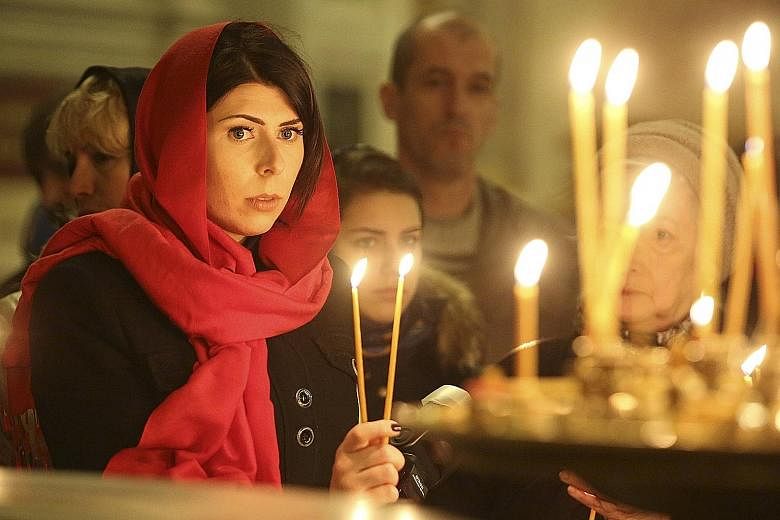MOSCOW • The main bell in St Isaac's Cathedral in St Petersburg tolled 224 times, once for each victim of the destruction of a Russian charter flight in Egypt over a week ago.
Although Russian President Vladimir Putin and his aides at first indignantly dismissed suspicions of a terrorist act, the Kremlin has since clearly come to grips with the idea that a bomb was probably involved in the crash.
Late last Friday, it suspended all travel by Russians to Egypt and initiated an emergency airlift that, by Sunday, had repatriated 11,000 Russians, according to the government.
Should an attack be confirmed - and particularly if the claim by the Islamic State in Iraq and Syria (ISIS) that it had bombed the plane in revenge for Russia's intervention in Syria turns out to be true - analysts and other experts expect that it will only strengthen Mr Putin's resolve to become more deeply involved in the Middle East.
First, Mr Putin said the Russian air force's bombing campaign in Syria was partly intended to help dismantle ISIS, which includes up to 7,000 fighters from Russia and the former Soviet Union.
One worry is that they might return to wage a terrorist war in Russia. An attack against a civilian airliner would confirm that Russian interests were already being threatened - and might cause Russia to begin targeting ISIS more aggressively.
Second, Mr Putin's Syrian intervention has been taken as an attempt to show that Russia has again become a global power capable of tackling the world's most intractable problems. Reversing course after the first setback, however violent, would undercut that image.
Third, the Russian leader has painted the West - the United States in particular - as quick to abandon its Arab allies since the dawn of the Arab Spring in 2011 and its chaotic aftermath.
Syria, now beleaguered, has been Russia's only Arab ally for decades, but Mr Putin has also been courting Egyptian President Abdel Fattah el-Sisi. A terrorist attack by enemies of the Egyptian government will most likely strengthen, not diminish, that effort.
Ever since the Russian air force began bombing targets in Syria at the end of September, Mr Putin has repeated the theme that it is better to attack terrorists in their home territory. His response in the face of any terrorist attack will probably be to double down, analysts said. But he is still likely to avoid committing ground forces, a move which polls show remains highly unpopular among Russians.
"If it was a terrorist act, that pushes the stakes higher and makes this Syria operation more costly," said political analyst Vladimir Frolov. "It also proves the point that terrorists have to be destroyed before they come to our own land."
He said the problem is that "Russia's current strategy cannot defeat ISIS".
Russia has deployed more than 50 combat aircraft in Syria, along with about 4,000 troops. About half of them are there as advisers and technicians, while most of the rest are ground forces needed to protect the pilots and bases.
The strategy as laid out by Mr Putin was that the Russian air force would bolster the weakened military forces under Syrian President Bashar al-Assad, allowing them to strengthen their hold on Syria and then to take on ISIS strongholds in western Syria, using Syrian and allied ground forces.
Centre for Political Technologies analyst Alexei Makarkin saw two main options for Russia. One was that "Russia can intensify the Syria operation, send more troops and volunteers to support Assad". That move would probably worsen already strained ties with the West.
In the second option, "fighting ISIS will become a priority rather than supporting Assad", Mr Makarkin said. "In this situation, Russia will pressure Assad to move towards a transitional government."
Those efforts had started, but not got very far, before the attack.
In the few instances Mr Putin has spoken about the crash, it was mostly to offer condolences. Soon, though, he will need to explain the catastrophe at home - especially given the Kremlin's initial insistence that the plane's downing was not linked to Syria.
Mr Stanislav Belkovsky, a political analyst and frequent Kremlin critic, argued that Mr Putin intervened in Syria to fulfil his own international political ambitions and so would avoid anything suggesting that ordinary Russians might pay a price for his gamble.
"They do not want to link the plane crash with Syria, because then the question is: 'Why did we go to fight in Syria at all? Does it correspond to Russia's basic national interests?' "
NEW YORK TIMES

